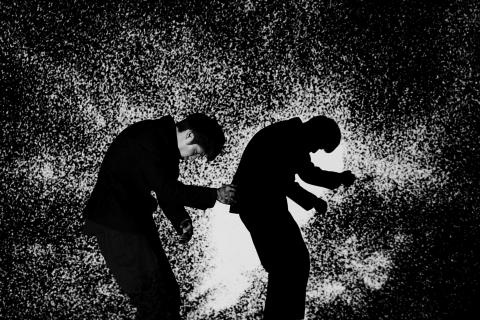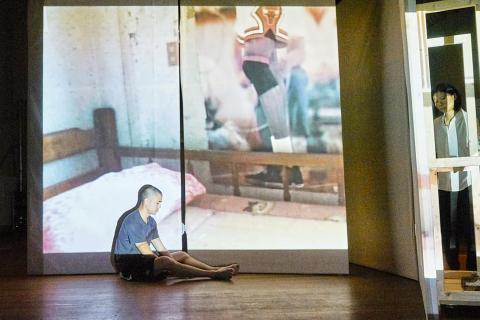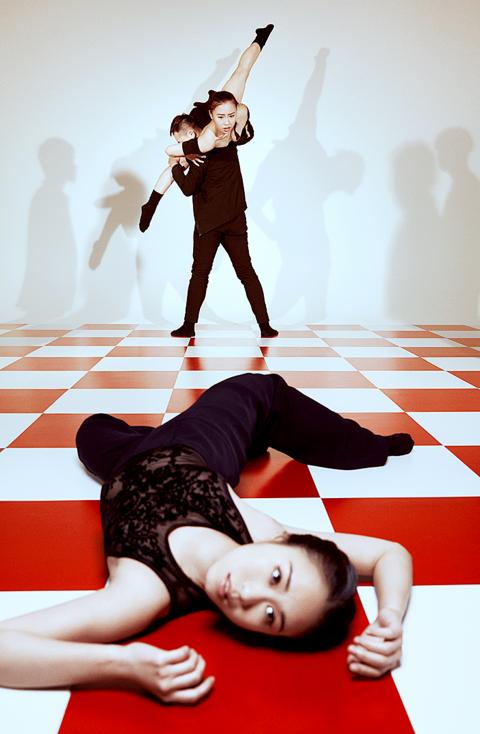Works by three of Taiwan’s younger generation of notable choreographers will be performed this weekend, two that wrap up the Taipei Arts Festival and one under the auspices of the Kuandu Arts Festival.
All three Taiwanese have developed substantial international contacts, two by touring their works and/or winning choreographic competitions abroad, and one who has been based in Essen, Germany for 14 years.
‘UNDER THE HORIZON’

Photo courtesy of Huang Yi Studio
Going strictly in chronological order, first up is Huang Yi Studio’s (黃翊工作室) Under The Horizon (地平面以下), which opens tonight at the Metropolitan Hall, and is considered one of the highlights of the Taipei Arts Festival.
Described as a “hybrid opera,” the show created by Huang Yi (地平), the Utrecht-based Nederlands Kamerkoor (Netherlands Chamber Choir) and Berlin-based Japanese multimedia and audiovisual artist Ryoichi Kurokawa, premiered on Sept. 21 in Utrecht, Netherlands.
Huang Yi gave a preview of the piece almost a year ago this month at the Cloud Gate Theatre and it was tantalizing.

Photo courtesy of Anna Westphal
Considered one of his generation’s most exciting talents, he has built a reputation for working with technology and Under The Horizon is likely to cement that reputation further.
Inspired by both the plight of refugees fleeing war, persecution or famine, as well as Chinese folklore that says the horizon is the dividing line between life and the netherworld (where souls exist as shadows), Huang Yi and Kurokawa have created a world where humans and shadows cross paths.
It is a show about the universal desire for hope, home, love and belonging. It is also about loss and longing.

Photo courtesy of Chou Mo
The www.artsticket.com.tw site has split the program into two listings: one is for tonight and tomorrow’s shows, which feature the choir; the second is for the three other shows, which will be performed to a recorded soundtrack.
For all five performances, there is an advisory that latecomers will not be admitted.
‘UNSOLVED’
The search for home is also one of the themes of the second production, the 70-minute dance-video installation by Polymer DMT (聚合舞), Unsolved (未解,懸), which opens tomorrow night at Huashan 1914 Creative Park’s Umay Theater.
Choreographer Luo Fang-yun (羅芳芸) founded the Essen-based Polymer DMT seven years ago, seeking to bring together artists and performers from different fields or cultural backgrounds to create dance-based works.
Unsolved was a collaboration with Hamburg-based video artist Hanna Linn Ernst, Swiss musician Patrik Zosso and Germany-based Taiwanese stage designer Cheng Ting-chen (陳成婷), and features Taiwanese hip-hop dancer Chung Chih-wen (鍾志文), along with Cheng and Anna Westphal.
Coproduced with PACT Zollverein Essen and the Taipei Arts Festival, the show premiered in Essen on Sept. 28, and its Taiwan premiere has been funded by the Goethe-Institut, Taipei.
Unsolved is partially autobiographical, inspired by Luo’s questions about her family’s history in Taiwan and conflicting identities in different worlds, set in an old family home, long abandoned.
Luo examines how personal identity and cultural identity are formed within families and the impact on both the individuals and the family as a whole. Unsolved is the first in a planned trilogy on the concepts of identity, home, heritage and tradition from an individual as well as political experience.
‘BLAH, BLAH, BLAH’
The third production this weekend is B.DANCE’s (丞舞製作團隊) Blah Blah Blah, a collaboration by choreographer Benson Tsai (蔡博丞) and Luxembourg-based artist Jill Crovisier, at Taipei National University of the Arts’ Dance Theater.
Blah Blah Blah’s two pieces explore cultural, social, political and gender differences and perspectives of modern society through the eyes of millennials, the conflict between glamor and desolation.
Tsai has been winning awards and accolades across Europe for the past four years, starting with his 10-minute Floating Flowers, a tribute to his late father, which won the Gauthier Dance and Stuttgart Theater Production Award at the 2014 Hannover International Competition for Choreographers, as well as the Audience Prize for Best Choreography at the 20th MASDANZA in Spain. It also spurred him to create his own company that same year.
His 2015 Hugin/Munin took first prize in choreography competitions in New York and Denmark and placed second at the Jerusalem International Dance Week, while the German dance magazine Tanz last year named him as one of the world’s 32 most promising choreographers.
This piece has been updated since it was first published to correct the date and location of the premiere of "Under The Horizon" from Oct. 3 in The Hague to Sept. 21 in Utrecht, Netherlands.
Performance Notes
What: Under The Horizon
When: Tonight, tomorrow and Saturday at 7:30pm, Saturday and Sunday at 2:30pm
Where: Metropolitan Hall (城市舞台), 25 Bade Rd, Sec 3, Taipei (台北市八德路三段25號).
Admission: NT$500 to NT$1,500. Available at NTCH box offices, Eslite ticket desks, online at www.artsticket.com.tw and convenience store ticket kiosks
What: Unsolved
When: Tomorrow and Saturday at 7:30pm, Saturday and Sunday at 2:30pm
Where: Huashan 1914 Creative Park (華山1914文化創意產業園區), Umay Theater (烏梅劇院), 1, Bade Rd Sec 1, Taipei City (台北市八德路一段1號)
Admission: NT$600, available at NTCH box offices, Eslite ticket desks, online at www.artsticket.com.tw and convenience store ticket kiosks
What: Blah Blah Blah
When: Saturday at 7:45pm and Sunday at 2:45pm
Where: Taipei National University of the Arts Dance Theater (國立臺北藝術大學展演藝術中心戲劇廳), 1 Xueyuan Rd, Guandu District, Taipei City (台北市關渡區學園路1號)
Admission: NT$900, NT$1,400 and NT$2,500; available online at www.artsticket.com.tw and convenience store ticket kiosks

April 28 to May 4 During the Japanese colonial era, a city’s “first” high school typically served Japanese students, while Taiwanese attended the “second” high school. Only in Taichung was this reversed. That’s because when Taichung First High School opened its doors on May 1, 1915 to serve Taiwanese students who were previously barred from secondary education, it was the only high school in town. Former principal Hideo Azukisawa threatened to quit when the government in 1922 attempted to transfer the “first” designation to a new local high school for Japanese students, leading to this unusual situation. Prior to the Taichung First

The Ministry of Education last month proposed a nationwide ban on mobile devices in schools, aiming to curb concerns over student phone addiction. Under the revised regulation, which will take effect in August, teachers and schools will be required to collect mobile devices — including phones, laptops and wearables devices — for safekeeping during school hours, unless they are being used for educational purposes. For Chang Fong-ching (張鳳琴), the ban will have a positive impact. “It’s a good move,” says the professor in the department of

On April 17, Chinese Nationalist Party (KMT) Chairman Eric Chu (朱立倫) launched a bold campaign to revive and revitalize the KMT base by calling for an impromptu rally at the Taipei prosecutor’s offices to protest recent arrests of KMT recall campaigners over allegations of forgery and fraud involving signatures of dead voters. The protest had no time to apply for permits and was illegal, but that played into the sense of opposition grievance at alleged weaponization of the judiciary by the Democratic Progressive Party (DPP) to “annihilate” the opposition parties. Blamed for faltering recall campaigns and faced with a KMT chair

Article 2 of the Additional Articles of the Constitution of the Republic of China (中華民國憲法增修條文) stipulates that upon a vote of no confidence in the premier, the president can dissolve the legislature within 10 days. If the legislature is dissolved, a new legislative election must be held within 60 days, and the legislators’ terms will then be reckoned from that election. Two weeks ago Taipei Mayor Chiang Wan-an (蔣萬安) of the Chinese Nationalist Party (KMT) proposed that the legislature hold a vote of no confidence in the premier and dare the president to dissolve the legislature. The legislature is currently controlled